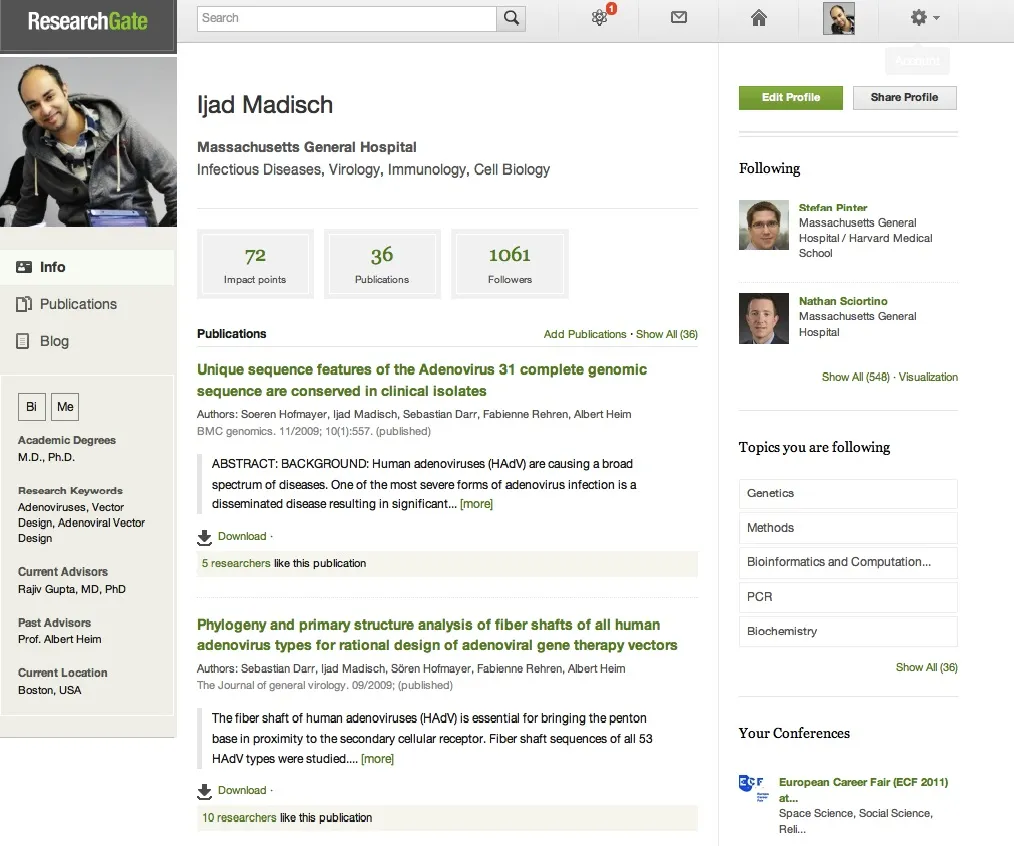
Recently a few trainees have inquired about ResearchGate, so we decided to take a further look at this site. It was founded in 2008 by two physicians who discovered that collaborating with a friend or colleague (especially one across the world) was no easy task. They created this website with the intent of helping make scientific progress happen faster.
ResearchGate has been described as a mash up of familiar social media sites like Facebook, Twitter and LinkedIn because it contains profile pages, groups, job listings, the ability to leave comments as well as “like” and “follow” buttons. However, this social networking site is designed exclusively for scientists and researchers. According to ResearchGate’s site, there are four million users and their primary aim is to:
• Share publications
• Seek new collaborations
• Ask questions and hopefully receive answers from like-minded researchers
• Connect with colleagues
ResearchGate is free to join and members can upload copies of their papers. All papers will be searchable, which also allows users to track and follow the research publications of others in their field. Researchers are encouraged to not only upload successful results but those from failed projects or experiments, which are stored in a separate but still searchable area. The official mission of this site states: We believe science should be open and transparent. This is why we’ve made it our mission to connect researchers and make it easy for them to share, discover, use, and distribute findings. We help researchers voice feedback and build reputation through open discussion and evaluations of each other’s research.
Some critics of ResearchGate argue that even though the site states that there are four million users, it seems there are a lot of inactive profiles. Another criticism has focused on the fact that there hasn’t been much buy in from senior researchers meaning a high percentage of users are students or junior researchers. If you decide to create a ResearchGate profile, make sure you tailor the notification and privacy settings associated with your account since some members have complained about unwanted email spamming.
At this point, ResearchGate shouldn’t be the only site you use for networking, but it can be another helpful tool to connect with like-minded scientists/researchers and additionally it can be another way to help promote your work. As with any site, the more effort you put in, the more you will likely get out of this resource.
We would love to hear your thoughts about ResearchGate! If you have used it, what do you see as the pros and cons? Do you have any recommendations for future users?
**Compilation of Readers' Reviews**
* In addition to networking, it is extremely useful as a research tool. A couple of points: -When users sign up the website automatically adds the publications that have your name and appear in your profile, it also continues searching and when one publishes an article it is also added automatically.
- It also suggests to connect with people that you cite and people who cite you so it is a tremendous tool to keep up with people in your field.
- People can ask questions about experiments and also get immediate feedback if they have questions about a publication instead of having to wonder.
- It allows you to follow senior investigators the same way one can follow a celebrity on Twitter, but there are no tweets and unless you ask a question all the conversations are personal, there are no "wall postings."
* It seems to be getting some traction with senior investigators. In the future, it may become more relevant to academia than perhaps LinkedIn. Within ResearchGate, it is easier to connect with senior investigators because requests are not sent to connect, rather one just "follows" researchers.




